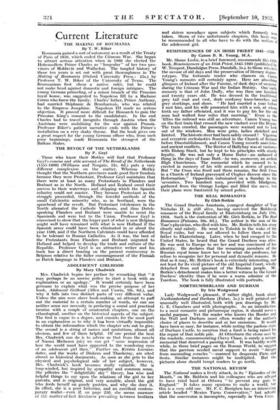Current Literature
Roumania gained a sort of autonomy as a result of the Treaty of Paris of 1856, which ended the Crimean War. She began to attract serious attention when in 1866 she elected the Hohenzollern Prince Charles as " hospodar" of her two pro- vinces of Moldavia and Wallaehai. The tangled history of those ten years is set out with great thoroughness in The Making of Roumania (Oxford University Press : 25s.) by Professor T. W. Riker of the University of Texas. The Roumanians first chose a native ruler, but he could not make head against domestic and foreign intrigues. The young German princeling, of a minor branch of the Prussian royal house, was suggested to Napoleon III by a Madame Cornu who knew the family. Charles' father, Prince Anthony, had married Stephanie de Beauharnais, who was related to the Empress Josephine. Napoleon III made no serious objection. It proved more difficult for Bismarck to gain the Prussian King's consent to the candidature. In the end Charles had to travel incognito through Austria when the Austrians were mobilizing for the war against Prussia. Professor Hiker's patient narrative ends with the Prince's installation on a very shaky throne. But the book gives one a great respect for the young German officer who, from such poor beginnings, made Roumania the strongest of the Balkan States.






























 Previous page
Previous page